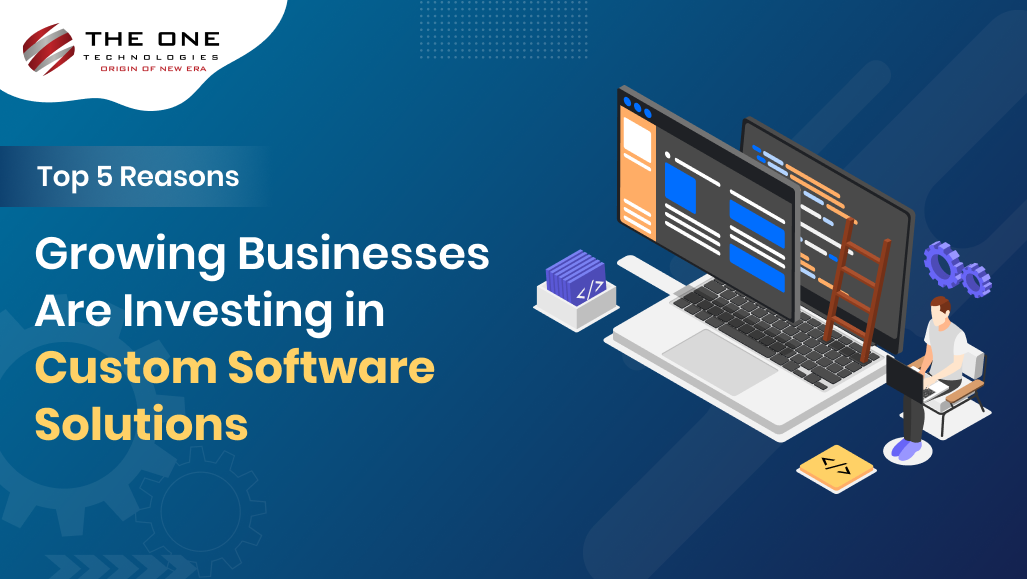Top 5 Reasons: Why Growing Businesses Are Investing in Custom Software Solutions

Is your off-the-shelf software more like a straitjacket than a useful utility? Often, expanding companies reach a roadblock with generic solutions, struggling with convoluted interfaces, processes not tailored to their operations, or surprise "premium" upgrade costs. Imagine custom software development services that fits your business like a well-customized suit – custom-designed to eliminate awkward gaps and unnecessary bulk, leaving you with technology that simply works the way you do.
Here’s why more businesses are making the switch (and why you might want to consider it too).
1. Built for Your Business
Ever felt like you're wrestling with software that just won't bend? It's like forcing a square peg into a round hole. Most software comes with its own set ways. So you end up changing how you do things to fit the program instead of the program fitting you.
Why custom software changes the game:
- It mirrors your actual workflows, cutting out pointless steps.
- Your team spends less time fighting the system and more time being productive.
- No paying for features you’ll never touch.
Real-world example:
Consider a specialty logistics firm that ships delicate artwork. Shelf-level routing software wouldn't consider their requirements for strict climate controls, but a tailored solution could integrate automated temperature verification, route optimization, and delivery notices into one location.
Pro tip: Before diving in, gather input from employees who’ll use the software daily. Their pain points are gold for shaping a solution that actually helps.
2. Grows With You, Without the Growing Pains
Here’s the thing about growth: it’s unpredictable. Maybe you're adding services, going after new customers, or just have more people to serve. Regular software usually can't handle that. Then you have to pay to upgrade or switch to a totally different setup.
Why custom software adapts better:
- Need a new feature? You can build it without waiting for a vendor’s next update.
- It scales seamlessly, whether you’re adding 10 users or 10,000.
- No surprise fees for "scaling up", you control the roadmap.
Example:
Picture an eco-friendly skincare brand that starts with a basic online store. As they grow, their custom platform easily adds subscription options, wholesale portals, and even a carbon-footprint tracker for customers, all without messy migrations.
Pro tip: Work with developers who offer ongoing support. Software isn’t a one-and-done deal; it should evolve as you do.
3. Plays Nice With Your Other Tools
If your team uses, say, five different apps that don't talk to each other, you're likely wasting time on manual data entry and messing things up. Think of it as a team with bad communication – stuff just falls through the cracks.
Why custom software connects the dots:
- Integrates smoothly with your CRM, accounting tools, and other systems.
- Reduces copy-paste chaos and duplicate entries.
- Gives you a unified view of operations (no more tab-switching fatigue).
Example:
A digital marketing office could connect its project dashboard to time-tracking and billing apps. Once a project is done, the system makes reports and bills clients automatically. So there's no need to work late figuring out the numbers.
Pro tip: Sketch out your ideal workflow first. Knowing which tools need to connect ensures your software acts as the glue, not another silo.
4. Security That Actually Fits Your Risks
Generic software is a hacker magnet. Why? If hackers break into one system, they might use the same method to attack other companies with similar setups. So, if you handle sensitive info like customer details, health records, or financial data? You need to take this threat seriously.
Why custom software locks things down better:
- Built-in security tailored to your industry’s regulations (GDPR, HIPAA, etc.).
- Fewer vulnerabilities since attackers can’t rely on widely known flaws.
- You decide when and how updates happen, no forced patches that break things.
Example:
A telehealth startup uses custom software with end-to-end encryption and strict access tiers. Patients get peace of mind, and the business avoids six-figure compliance fines.
Pro tip: Don’t treat security as an afterthought. Bake it into development from day one with regular audits.
5. Turns Customers into Fans
Want to know a secret? Customers notice when your tech just works. Imagine getting through checkout super fast. Getting suggestions that are actually useful and getting help the moment you need it. When you have custom software, you can provide experiences like these. Something you just can't create with standard, out-of-the-box tools.
Why custom software wows customers:
- Enables features competitors lack (think: custom loyalty programs or real-time inventory updates).
- Lets you pivot fast based on feedback, no waiting for vendor updates.
- Happy customers stick around and refer others.
Example:
A specialty coffee roaster’s custom app lets subscribers adjust grind settings, skip shipments, or add limited-edition beans with a tap. It feels bespoke, because it is.
Pro tip: Use customer behavior data to refine your software. Small tweaks, like saving checkout preferences, can boost satisfaction big-time.
So, Is Custom Software Worth It?
Forget the idea that only huge companies such as Amazon or Netflix can have custom solutions. Nowadays, the tools available — especially when working with a trusted software development company in USA; mean that custom software is within reach for growing businesses that want to be more efficient, keep their data safe, and be unique.
Next steps: Grab a notepad and list your top three tech headaches. Could flexible, purpose-built software solve them? If yes, it might be time to explore your options.









